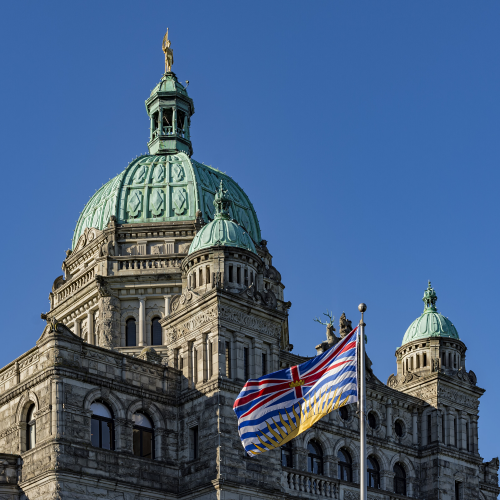Last updated: February 18 2020
BC Budget Raises Tax on Top Earners

Evelyn Jacks
It is definitely a retirement haven, and up until February 18th, BC was somewhat of a tax haven as well. Unfortunately, the top 1% of income earners in BC will pay $216 million more taxes starting January 1, 2020, as a result of yesterday’s provincial budget. The top tax rate and income bracket has increased 3.7% from 16.8% to 20.5% on taxable incomes over $220,000. This is a change that will affect marginal tax rates on various income sources, including retirement income, and taxable income on final returns of deceased taxpayers, as shown below:
Federal and Provincial (BC) Marginal Tax Rates for 2020
|
Taxable Income Range |
Ordinary Income |
Capital Gains |
Small Bus. Corp. Div. |
Eligible Div. |
|
Up to $10,949 $10,950 to $13,229 $13,230 to $41,725 $41,726 to $48,535 $48,356 to $83,451 $83,452 to $95,812 $95,813 to $97,069 $97,070 to $116,344 $116,345 to $150,473 $150,474 to $157,748 $157,749 to $214,368 $214,368 to $220,000 Over $220,000 |
0% 5.06% 20.06% 22.70% 28.20% 31.00% 32.79% 38.29% 40.70% 43.92% 46.02% 49.80% 53.50% |
0% 2.53% 10.03% 11.35% 14.10% 15.50% 16.40% 19.15% 20.35% 21.96% 23.01% 24.90% 26.75% |
0% 3.56% 10.43% 13.47% 19.79% 23.01% 25.07% 31.39% 34.17% 37.87% 40.29% 44.63% 48.89% |
0% -9.58% -9.60% -5.96% 1.63% 5.49% 7.96% 15.55% 18.88% 23.31% 26.22% 31.44% 36.54% |
Planning for Final Returns. This development is particularly important for estate planning purposes and must be addressed by Real Wealth Managers™ and their clients immediately. Here’s the tax theory: last surviving spouses or any single people who pass away must add into the income of the final return all untaxed RRSP, RRIF and other fully taxed income sources. It would not be unusual that Canadians are pushed into this new top tax bracket in those cases. You can see, the government will get more than half of the balance of the funds in that case. The objective, then, is to spread out the taxes payable during a taxpayer’s lifetime by creating taxable income under $220,000 for best results.
Three new tax hikes come into effect in July 2020. First, the PST will apply to sweetened carbonated beverages. There will be a new tax on Canadian sellers of vaping products and, finally, foreign sellers of software and telecommunications services will have to register for PST.
In resource taxation, three changes have been made:
- The New Mine Allowance has been extended to the end of 2025
- Carbon Taxe. Effective April 1, 2020, the BC carbon tax rates for 2020 and 2021 will be aligned with the federal carbon pricing backstop. The tax rate for gasoline will be 9.96
 centres per litre on April 1, 2020.
centres per litre on April 1, 2020. - International Fuel Tax Agreement licenses will be adjusted to align with the federal carbon pricing backstop methodology.
Changes for students. Meanwhile, students will be happy with the announcement of a new type of grant, the B.C. Access Grant, which will bring funding of up to $4000 to approximately 40,000 students this fall. In addition, the tuition and education tax credits available under the Income Tax Act will continue for three more year to the end of 2022.
Changes for Canadian Controlled Limited Partnerships. A new exemption to property transfer taxes will be allowed, thereby treating these partnerships in a similar manner to CCPCs.
Tax changes for corporations. Effective on royal assent, corporations may not claim the political contributions tax credit. Also, the deadline to claim the Film Incentive BC and the production services tax credits will be reduced to 18 months after February 18, 2020. In addition, employees will be allowed to reimburse their employers any overpaid amount net of BC income taxes withheld. This change is in effect for unincorporated businesses as well.
Grant for Home-Owner Grant Phase-Out. The threshold will be $1,525,000 for the 2020 year, which means that about 92% of homes will be valued below this threshold. Other changes affect property taxes in municipal taxation, port land valuation, school taxes and rural property taxes.
PST changes. Three more tax hikes come into effect in July 2020 through the Provincial Sales Tax Act. First, the PST will apply to sweetened carbonated beverages. There will be a new tax on Canadian sellers of vaping products and, finally, there will be a new tax on foreign sellers of software and telecommunications services in Canada.
These sellers, together with their Canadian counterparts, will need to register as tax collectors if BC revenues exceed $10,000. Those who sell vapour products will be required to register as well if they deliver vapour products to BC customers. The end game is that provincial sales taxes will be collected by more businesses operating in the digital economy.
There are other changes of interest to these specific taxpayers:
- Effective February 19, 2020, electric aircraft are exempt from provincial sales taxes. Also a refund will be allowed for non-electric aircraft which convert to operating on electricity.
- Real property contractors who perform value-added work to goods installed outside of BC can apply for provincial sales tax refunds.
Evelyn Jacks is Founder and President of Knowledge Bureau and author of 55 books on ways to file the best returns for your family’s time and money and how to make the most tax-efficient business and investment decisions. Follow her on twitter @evelynjacks.
Additional educational resources: Help your clients, or help yourself generate tax-efficient retirement income by taking the MFA™ – Retirement & Succession Services Specialist Program or the newly revised RWM™ Certification Program.
COPYRIGHT OWNED BY KNOWLEDGE BUREAU INC., 2020.
UNAUTHORIZED REPRODUCTION, IN WHOLE OR IN PART, IS PROHIBITED.
